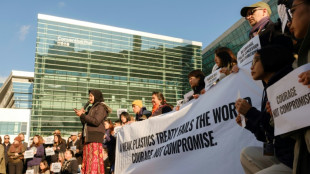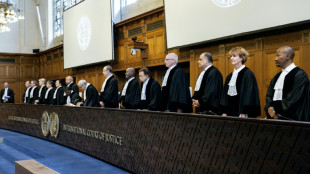
-
 UK transport secretary quits in setback for Starmer
UK transport secretary quits in setback for Starmer
-
Days before deadline, plastic treaty draft highlights disagreement

-
 Crypto boss eats banana art he bought for $6.2 million
Crypto boss eats banana art he bought for $6.2 million
-
Teen news boss criticises Australian social media ban

-
 Taiwan detects 41 Chinese military aircraft, ships ahead of Lai US stopover
Taiwan detects 41 Chinese military aircraft, ships ahead of Lai US stopover
-
Spain urged to 'build differently' after deadly floods

-
 WTO chief faces heavy task as Trump threat looms
WTO chief faces heavy task as Trump threat looms
-
Herbert takes control at Australian Open as Smith tanks

-
 Israel PM again warns Iran after top diplomat talks of revising nuclear doctrine
Israel PM again warns Iran after top diplomat talks of revising nuclear doctrine
-
Brilliant Brook's 132 puts England on top against sloppy New Zealand

-
 Brilliant Brook's 132 puts England on top against New Zealand
Brilliant Brook's 132 puts England on top against New Zealand
-
US landmine offer to Ukraine throws global treaty into 'crisis': campaign group

-
 Singapore hangs 4th person in three weeks
Singapore hangs 4th person in three weeks
-
Five things to know about NewJeans' shock split from agency

-
 Waste pickers battle for recognition at plastic treaty talks
Waste pickers battle for recognition at plastic treaty talks
-
Ireland votes in closely fought general election

-
 Top UN court to open unprecedented climate hearings
Top UN court to open unprecedented climate hearings
-
European countries that allow assisted dying

-
 British MPs to debate contentious assisted dying law
British MPs to debate contentious assisted dying law
-
Schmidt not expecting hero's welcome on Ireland return

-
 PSG stuck between domestic dominance and Champions League woes
PSG stuck between domestic dominance and Champions League woes
-
'Hot fight' as unbeaten Bayern visit Dortmund fortress

-
 Bordeaux-Begles' Samu 'not finished yet' with Wallabies
Bordeaux-Begles' Samu 'not finished yet' with Wallabies
-
Brook and Pope half-centuries haul England to 174-4 against NZ

-
 Yen rallies on rate hike bets as equity markets swing
Yen rallies on rate hike bets as equity markets swing
-
Ukraine superstar Mahuchikh brings 'good vibes' to her war-torn country

-
 PlayStation at 30: How Sony's grey box conquered gaming
PlayStation at 30: How Sony's grey box conquered gaming
-
Saudi Arabia hosts UN talks on drought, desertification

-
 PlayStation: Fun facts to know as Sony's console turns 30
PlayStation: Fun facts to know as Sony's console turns 30
-
Nepal's first transgender candidates run for local office

-
 Father of PlayStation says 'everyone told us we would fail'
Father of PlayStation says 'everyone told us we would fail'
-
Ireland seek to overcome former coach Schmidt's Wallabies

-
 Detroit survive Bears comeback to make it 10 wins in a row
Detroit survive Bears comeback to make it 10 wins in a row
-
Mexican actor Silvia Pinal dead at 93

-
 'Black Friday' deals target inflation-weary US consumers
'Black Friday' deals target inflation-weary US consumers
-
Liverpool look to deepen Man City crisis, Amorim seeks first Premier League win

-
 Police fire rubber bullets, tear gas at Georgia protesters after PM delays EU bid
Police fire rubber bullets, tear gas at Georgia protesters after PM delays EU bid
-
England lose three quick wickets in reply to New Zealand's 348

-
 Social media companies slam Australia's under-16 ban
Social media companies slam Australia's under-16 ban
-
Police fire tear gas at Georgia protesters after PM delays EU bid

-
 Canada watchdog sues Google over 'anti-competitive' ad tech
Canada watchdog sues Google over 'anti-competitive' ad tech
-
Hojlund gives Amorim winning Old Trafford bow, Roma hold Spurs

-
 Amorim wins first Man Utd home game after rollercoaster ride
Amorim wins first Man Utd home game after rollercoaster ride
-
France arrests 26 as South Asian migrant trafficking ring smashed

-
 At least 15 dead, 113 missing, in Uganda landslides
At least 15 dead, 113 missing, in Uganda landslides
-
Netanyahu threatens 'intensive war' if Hezbollah breaches fragile truce

-
 Bilbao join Lazio at Europa League summit, Chelsea cruise in Conference League
Bilbao join Lazio at Europa League summit, Chelsea cruise in Conference League
-
In Lebanon's Tyre returning residents find no water, little power

-
 Protests in Georgia after PM delays EU bid to 2028
Protests in Georgia after PM delays EU bid to 2028
-
Biden slams Trump tariff threats as 'counterproductive'


Threats and diplomacy: Iran's dual strategy on Israel
Awaiting Israel's promised retaliation for a missile attack earlier this month, Iran has balanced threats of a fierce response to any Israeli attack with diplomatic efforts to prevent escalation into all-out regional war.
Iran launched 200 missiles at its arch-foe on October 1 in response to an Israeli strike that killed Iranian general Abbas Nilforoushan and Hezbollah chief Hassan Nasrallah in Beirut late last month.
The missile barrage was also in retaliation for Hamas chief Ismail Haniyeh, who was killed in Tehran in July in an attack widely blamed on Israel.
Israel has vowed to respond to the Iranian missile barrage with a "deadly, precise and surprising," attack, according to Israeli Defence Minister Yoav Gallant, leading Iran to warn that it would in turn hit back if struck.
"If you make a mistake and attack our targets, whether in the region or in Iran, we will strike you again painfully," Iran's Revolutionary Guards chief Hossein Salami said on Thursday.
"The Zionist enemy should know that it is approaching the end of its miserable life," the chief of staff of the Iranian armed forces, General Mohammad Bagheri, said on Friday, calling Israel a "cancerous tumour".
Since the revolution that toppled the US-backed Shah in 1979, the Islamic republic has not recognised Israel, and has made support for Palestinians a pillar of its foreign policy.
Both Hamas and Hezbollah are part of the "axis of resistance," Tehran-aligned armed groups arrayed against Israel.
- Two positions not 'contradictory' -
The warnings from Iran's military chiefs come as Iranian Foreign Minister Abbas Araghchi has embarked on a regional tour in an intense diplomatic effort to prevent the conflict from spreading across the region.
Iran's top diplomat has visited nine capitals in two weeks and talked with United Nations chief Antonio Guterres on Tuesday.
"We cannot say that these positions (of Iran) are contradictory," Tehran-based international relations expert Ahmad Zeidabadi told AFP.
Araghchi "repeats the words of the military", including that if Israel attacks, "Iran will give a painful response," Zeidabadi said.
He added that Araghchi has said Iran is "totally ready for war," while the country also intends to "reduce the escalation".
"The question is to know by what mechanism," Zeidabadi added.
Araghchi visited Lebanon's capital Beirut a week after Nasrallah's death.
The minister then went to Damascus where he met with his Syrian counterpart and President Bashar al-Assad, a close ally of Tehran.
- Pursuing 'different objectives' -
These visits allowed Tehran "to reiterate Iran's commitment to supporting its allies in the axis of resistance," Hamidreza Azizi, a Berlin-based analyst at the Middle East Council on Global Affairs, told AFP.
Araghchi also travelled to Saudi Arabia -- whose ties with Iran have warmed in the past year -- as well as Qatar, Iraq and Oman, the latter of which has long mediated indirect talks between Iran and the United States.
He then flew to Jordan, which has complicated relations with Tehran, then to Egypt, for the first trip there by an Iranian foreign minister since 2013.
On Friday, Araghchi was in Turkey, where he reiterated that Iran is "ready for any situation".
"Iran wants Arab countries to turn away from the Israeli axis", Zeidabadi said, after the United Arab Emirates, Bahrain and Morocco normalised ties with Israel under the 2020 Abraham Accords backed by the US.
Azizi said Iran is pursuing "different objectives".
In addition to reaffirming support for its allies, Araghchi has also delivered "a combination of warning and reassurance" to some Gulf countries, he said.
"Everybody is awaiting the Israeli response to the Iranian attack... and there have been talks about the potential use of the Arab states' airspace" for attacking Iran, Azizi added.
Araghchi has given a "warning to these countries not to allow their territory or their airspace to be used for attacking Iran," Azizi said.
At the same time Araghchi has been "reassuring that Iran is still committed to the improvements of relations with these countries," the expert added.
"The foreign minister seeks to urgently bring together the policies of Iran and Arab countries" and to "reduce the military adventurism of Israeli leaders," the government's official newspaper Iran Daily said on Thursday.
"His diplomatic efforts aim to create peace and put an end to Israel's crimes in the region," it added.
J.Bergmann--BTB
